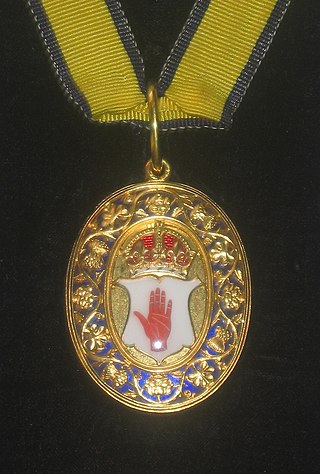
A baronet or the female equivalent, a baronetess, is the holder of a baronetcy, a hereditary title awarded by the British Crown. The title of baronet is mentioned as early as the 14th century; however, in its current usage it was created by James I of England in 1611 as a means of raising funds for the crown.
There have been two baronetcies created for persons with the surname Waller, one in the Baronetage of Ireland and one in the Baronetage of the United Kingdom. One creation is extant as of 2019.
There have been four baronetcies created for persons with the surname Leslie, one in the Baronetage of Nova Scotia, one in the Baronetage of Ireland, one in the Baronetage of Great Britain and one in the Baronetage of the United Kingdom. Three of the creations are extant as of 2010.
The Mander baronetcy, of The Mount, Tettenhall Wood, in the County of Staffordshire, was created in the Baronetage of the United Kingdom on 8 July 1911 in the Coronation honours of King George V, for Sir Charles Tertius Mander, English varnish and colour manufacturer and public servant.

There have been two baronetcies created for members of the Trevelyan family, one in the Baronetage of England and one in the Baronetage of the United Kingdom. As of 2014, both creations are extant.

There have been two baronetcies created for persons with the surname Brodie, both in the Baronetage of the United Kingdom.
The Miles Baronetcy, of Leigh Court in the County of Somerset, is a title in the Baronetage of the United Kingdom. It was created on 19 April 1859 for the banker and Conservative politician William Miles. His son, the second Baronet, was also a banker and Conservative politician. The family's bank, founded in 1750, eventually became part of NatWest.
There have been three baronetcies created for persons with the surname Power, all in the Baronetage of the United Kingdom.
There have been two baronetcies created for persons with the surname Wakeman, one in the Baronetage of England and one in the Baronetage of the United Kingdom.
There have been four baronetcies created for persons with the surname O'Brien, one in the Baronetage of Ireland and three in the Baronetage of the United Kingdom.

The Price, later Rugge-Price Baronetcy, of Spring Grove in Richmond in the County of Surrey, is a title in the Baronetage of the United Kingdom. It was created on 2 February 1804 for Charles Price, Member of Parliament for the City of London from 1802 to 1812 and Lord Mayor of London from 1802 to 1803. The fifth Baronet assumed in 1874 by Royal licence the additional surname of Rugge. As of 28 February 2014 the present Baronet has not successfully proven his succession and is therefore not on the Official Roll of the Baronetage, with the baronetcy considered dormant since 2000.

The Wombwell Baronetcy, of Wombwell in the County of York, is a title in the Baronetage of Great Britain. It was created on 26 August 1778 for George Wombwell, Chairman of the Honourable East India Company and Member of Parliament for Huntingdon. The fourth Baronet fought in the Crimean War and took part in the Charge of the Light Brigade and in 1861 served as High Sheriff of Yorkshire. As of 13 June 2007 the presumed seventh and present Baronet had not successfully proven his succession to the title, and is therefore not on the Official Roll of the Baronetage, with the baronetcy considered dormant since 1977.
There have been four baronetcies created for members of the Thorold family of Lincolnshire, two in the Baronetage of England and two in the Baronetage of Great Britain. As of 2014 one creation is extant.

There have been two baronetcies created for members of the Scottish Pringle family, one in the Baronetage of Nova Scotia and one in the Baronetage of Great Britain. As of 2023, one creation is extant.
There have been three baronetcies created for persons with the surname Maitland, two in the Baronetage of Nova Scotia and one in the Baronetage of the United Kingdom. Two of the creations are extant as of 2008 while the other is either dormant or extinct.
The Official Roll of the Baronetage is an official list of baronets kept by the Lord Chancellor; an abridged version is published online by the Standing Council of the Baronetage.

The Jackson baronetcy, of Arlsey in the County of Bedford, was created in the Baronetage of the United Kingdom on 22 May 1851 for John Jackson. He was a Director of the Honourable East India Company and also represented Dover in the House of Commons.